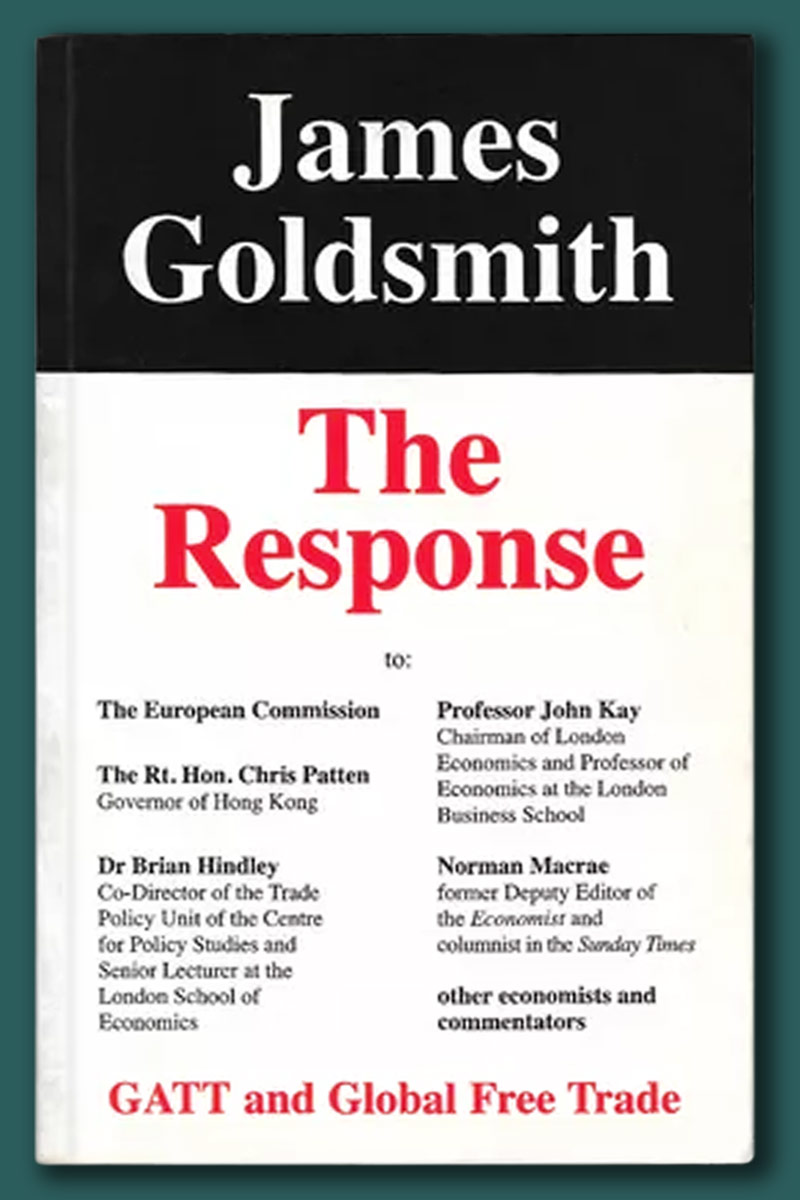
Book Reviews
The Response
by Sir James Goldsmith
Macmillan 1995.
Review by Andy Johnson
Squall 12, Spring 1996, pg. 58.
Sir James Goldsmith is the kind of person who may reasonably be termed a “dodgy geezer”. As a former international financier he made an estimated $2 billion playing the money markets. He has homes in Paris and Mexico.
Last year he was elected to the European parliament - for a French constituency - on an anti-European Union ticket. In the next British general election he intends to field a candidate for his Referendum Party (against Europe) in every constituency.
In 1994 he published a book called “The Trap” - a damning critique of GATT, the Global Agreement of Tariffs and Trade, which brings the philosophy of unrestricted free trade to the entire globe. GATT has become an unquestioned economic creed.
“I believe that Gatt....will impoverish and destabilise the industrialised world while at the same time cruelly ravaging the third world,” he writes.
Gatt.... will impoverish and destabilise the industrialised world while at the same time cruelly ravaging the third world.”
The Trap argues that by removing trade restrictions multinational corporations will have instant access to 4 billion low paid, non-unionised, labour in countries that have no environmental legislation. This will give them “an inexhaustible supply of cheap labour”. For the same cost of employing one worker in France, for example, a company could employ 47 workers in Vietnam or the Phillipines.
In the “Third World” consequential rapid industrialisation will, he argues, destroy systems of agriculture and culture, driving labourers off the land and into overcrowded cities. There have already been demonstrations of up to a million people against GATT in India.
The Trap quotes Vandana Shiva, an eminent Indian philosopher and physicist:
“In India”, she says, “global free trade will mean a further destruction of our communities, uprooting of millions of small peasants from their land, and their migration into the slums of overcrowded cities. GATT destroys the cultural diversity and social stability of our nation…. GATT, for us, implies recolonisation.”
“GATT,” says Goldsmith, “must be rejected. The damage it will inflict on the communities of both the developed world and the third world will be intolerable.”
Unsurprisingly, Western economic gurus, for whom GATT is the only forward economic path, lambasted Sir James for his heresy. He was dismissed as an eccentric vanity publisher. The Response is, well, his response to that criticism.
Don’t be put off by the seemingly heavy economic subject matter. In simple, articulate language, and using easy to follow diagrams, Goldsmith takes each criticism and demolishes it. It includes the relevant chapter from The Trap, together with a 15 point list and everyday comparisons which takes you through the argument.
For all this, Goldsmith is no less dodgy. He is still a capitalist - although he prefers to keep trade on a more local footing.
But for anyone who is beginning to realise, or who already believes, that many of the evils in the world can be traced back to an unrestrained quest for profit, it is an essential book to understand the complexities of a new global system that is likely to wreak even more havoc. Information is a weapon.
Related Articles
Trade Offish - Activists are achieving unprecedented success in redefining globalisation as a dirty word - the World Trade Organisation attempts to improve its public image - Nov 1999
